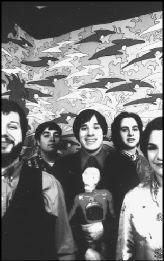DESPITE HIS long-standing obsession with Joy Division’s Ian Curtis, Arab Strap singer-songwriter Aidan Moffat is not a morose guy. Over the telephone, it’s difficult to reconcile the chipper voice that beams from the New York headquarters of Matador, the band’s stateside label, with the doleful musings found on Arab Strap recordings. Except for the thick Scottish brogue, the two personalities of Aidan seem as different as salt and pepper.
Arab Strap
Graceland, Friday, April 20
“I’m never depressed!” he exclaims. “People sometimes get quite surprised when they meet me and find I’m quite cheerful. If I was like that every day of my life, I’d have some serious mental problems.”
Moffat’s tone changes just a few minutes later, however, when he spills the news that he’s just separated from his longtime girlfriend. “It’s the girl that was on the front of [our albums] Philophobia and Elephant Shoe,” he laments. “So all of my back catalog records, not only are they about her, but they’ve a fucking picture of her on them as well. I can’t even look at the records, much less listen to ’em!”
That sounds more like the embittered, lovelorn voice that has propelled Arab Strap since their inception six years ago in the small town of Falkirk, Scotland. Moffat, along with guitarist Malcolm Middleton, has made it his trademark to turn a critical eye on the jagged landscape of love, writing about the nasty pains that people inflict on one another. Over the course of four studio records—1996’s The Week Never Starts Round Here, 1998’s Philophobia (both on Scottish label Chemikal Underground and Matador in the U.S.), 1999’s Elephant Shoe (on Go! Beat/Jetset), and the recently released The Red Thread (back on Chemikal Underground/Matador)—the pair have left no intimacy unspoken, no secret untold, and no personal detail unexposed. Now, Moffat and Middleton, along with drummer David Gow and bassist Gary Miller, are setting off on their first full-length U.S. tour, baring their souls to whomever might care to listen.
MUSICALLY, The Red Thread is a complex record. Middleton’s guitars stretch beyond simple minor chords, adding a backbone of riffs to each song. Lo-fi drum machine and percussion tracks lend a charmingly off-kilter rhythm. Even with only four weeks of studio time to record, Arab Strap have managed more symphonic instrumentation this time out: On “Scenery,” the subtle choruses swell with keyboards and electronic noises, and on the gorgeous “Haunt Me,” strings burst out like fireworks.
Moffat has improved his vocals as well, moving past the mumbling drone of The Week and Philophobia and into melodic singing. “The vocals were never meant to sound the way that they sounded on the previous records,” he explains. “It’s just that I wasn’t capable of making them sound the way I wanted them to sound. I’ve always wanted to try and sing more; it’s just taken me a long time to get used to it and get comfortable enough to even try.”
Lyrically, The Red Thread continues to explore emotions like uncertainty and doubt, especially as they appear in Moffat’s own life. Like Ian Curtis, he purposefully seeks out hidden ugliness, stripping away each emotion to a bare-naked skeleton. The words are blunt and always brutally honest. On “Last Orders,” the ephemeral nature of sexual attraction becomes grounds for a breakup, and on “Love Detective,” he relates his discovery of an unfaithful lover’s diary of sexual exploits: “Eventually I had to stop reading because I started to feel sick,” he sings.
Incidentally, “Love Detective” is unrelated to the recent demise of his relationship, though he admits there are similarities between the situations. “I’m starting to think I’ve got a sixth sense for this sort of thing. . . . Maybe there’s something deep that says I only want to go with someone who’s going to hurt me,” he says, laughing. “I know I’m going to make money out of it as well by making records.”
But despite this cynicism and acerbic outlook, it’s obvious that this Aidan is not so different from the one who earlier claimed to be perpetually cheerful. The truth is that Moffat is an optimist—especially in his attitude toward love. The Red Thread takes its name from the Japanese idea that humans are connected to their soul mates by an invisible red thread. And, as the title of the record might suggest, a few dulcet love songs nestle among the bitter pills. On “Amor Veneris,” the record’s standout opener, Moffat sings over a muted piano line, “It’s best in the morning/When we know it won’t be rushed/So leave the curtains closed/And come back when you’ve brushed.”
“It’s one of the nicest things I’ve ever written about anybody,” he admits sheepishly. He pauses for a minute, exhaling once before the irony creeps back in. Finally, he mutters under his breath, “I don’t think she even bothered to fucking listen!”








